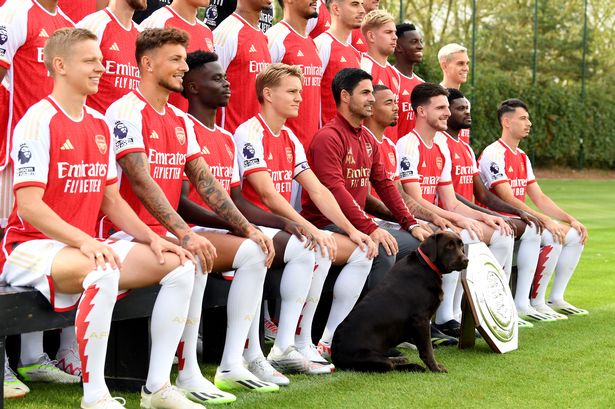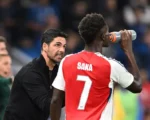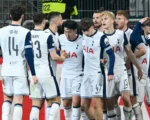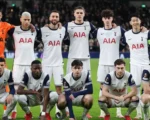Howard Webb has finally acknowledged it was the wrong decision to show Myles Lewis-Skelly a straight red card against Wolverhampton Wanderers.
Michael Oliver dismissed the Arsenal player for a challenge on Wolves defender Matt Doherty that the referee deemed serious foul play. Lewis-Skelly, though, did not serve a three-match suspension as an independent regulatory commission upheld a claim by the Gunners of wrongful dismissal.
The referee’s audio is now public weeks later, being broadcast on the latest episode of Match Officials Mic’d Up. Webb, the PGMOL chief refereeing officer, addressed the incident on the programme – saying that the verdict following the game was that the challenge was actually ‘falling short of serious foul play’ and so shouldn’t have resulted in a sending off .
“From the outset, we would prefer a yellow card in this situation,” Webb said. “Clearly, the referee on the day felt the actions of Myles Lewis-Skelly; he saw the player moving in towards an opponent without any ability or intention of playing the ball – with the intention of stopping the opponent.
“And the referee sees a raised foot make high contact, and the opponent went down. The referee felt it was serious foul play.
“The VAR checked the footage to see if the call was clearly and obviously wrong, and he felt it wasn’t – seeing that the contact was quite high up on the leg. But we know that for serious foul play, we need excessive force or brutality, and what we see here is that high contact [just] glancing and coming off the leg quite quickly.
“So for that reason, everybody pretty much in the game has formed the same conclusion that this is falling short of serious foul play – because of that glancing contact. Because the studs don’t really go right into the leg, they glance in before coming down onto the foot.”
Webb continued: “There are some considerations that might support a red card, but there are a whole host of others that say it is not quite there, so on balance, we would rather this had been a yellow card.
“The VAR didn’t want to re-referee the situation; they were mindful of the referee’s call standing unless it was clearly and obviously wrong. They felt it wasn’t at that level on the day and decided to leave it as a red card on the field.
“I’ve heard this described as a really horrendous officiating decision. It’s not! I understand why the referee saw this on the day as a serious foul-play action.
“We have to be careful about slowing things down and freeze-framing things. We’ve talked about not doing that; it can distort reality. We have to look at it at full speed; it is glancing [studs] and does come off quite quickly.
“But it’s an understandable on-field decision. Yes, we feel the VAR should have been involved, but at the same time, I can kind of understand why that didn’t happen in the moment.
“We listen to the game, we feed back to the officials to try to ensure that we are in line with the expectations of the game and how we judge these things.”
Join the football.london Arsenal WhatsApp channel

Join our Arsenal WhatsApp channel and get all the latest breaking news, opinion, podcasts and in-depth stories from football.london’s dedicated Arsenal writers straight to your phone!
By following this free service you will be the first to know the news from the Emirates Stadium as it happens, when it happens.
To join our dedicated Arsenal channel, all you have to do is click this link and you can join thousands of others following our Gunners coverage!
If you’re curious, you can check out our privacy policy here.







